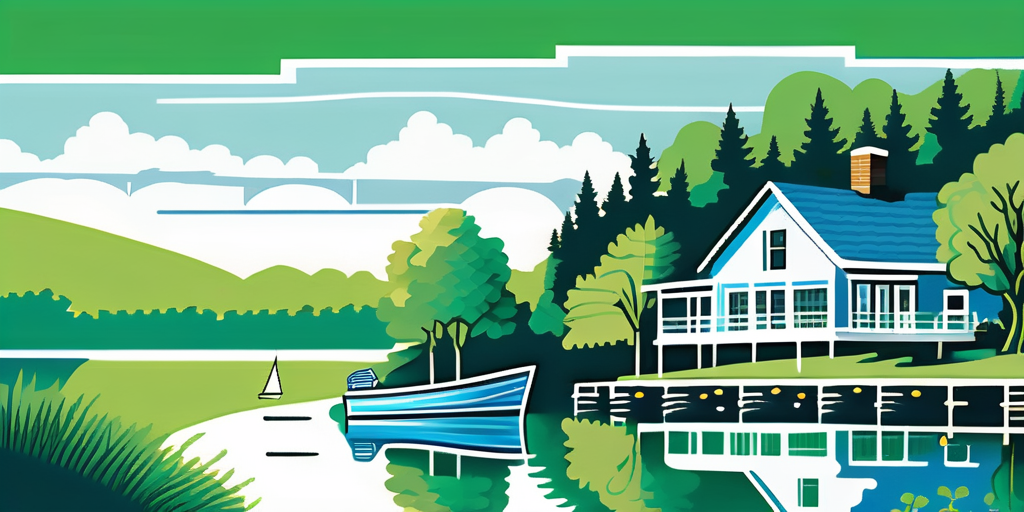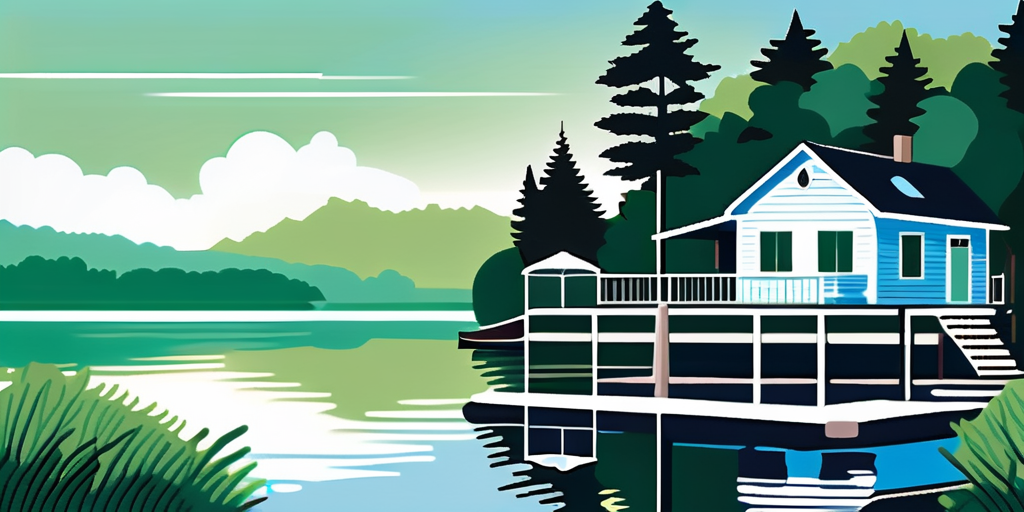
If you've ever dreamed of waking up to the serene sounds of water lapping against the shore or enjoying a sunset over a picturesque lake, then the lake lifestyle in Tennessee might just be what you're looking for. This guide is designed to provide you with everything you need to know about lake lifestyle real estate in the beautiful Volunteer State.
Lakeside living offers a unique combination of natural beauty, recreation, and a laid-back atmosphere. The allure of living by the water draws many people from different walks of life. Whether you’re looking for a vacation home, a retirement haven, or a primary residence, lake lifestyle homes can fit a variety of needs.
One of the greatest attractions of lakeside living is the peace and tranquility that comes with it. Imagine sipping your morning coffee while watching the mist rise off the water. For many, lakeside homes provide a lifestyle that’s a step removed from the hustle and bustle of city life.
Additionally, climate is a huge factor. Tennessee experiences mild winters and warm summers, making it ideal for year-round living or vacationing. Lakes provide ample opportunities for activities such as fishing, boating, kayaking, and swimming, ensuring that life on the water is never boring. The changing seasons also bring a stunning array of colors, from vibrant autumn leaves to the serene stillness of a snowy lakeside, allowing residents to enjoy nature's beauty throughout the year.
Tennessee is home to some of the most beautiful lakes in the country, including Norris Lake, Douglas Lake, and Dale Hollow Lake. Each lake offers its own unique charm and a variety of recreational activities. The scenic beauty of the Appalachian Mountains also adds to the appeal and overall lake experience.
Moreover, Tennessee is known for its friendliness and hospitality, making it a welcoming place for newcomers. The cost of living is generally lower than in many other states, allowing you to get more bang for your buck when purchasing lakeside property. The local communities often host events and festivals that celebrate the lake lifestyle, from fishing tournaments to summer concerts by the water. These gatherings foster a sense of community and provide opportunities for residents to connect with their neighbors and enjoy the vibrant culture that surrounds lakeside living.
Furthermore, the accessibility of these lakes is a significant advantage. Many lakes are conveniently located near major highways and towns, providing easy access to shopping, dining, and entertainment. This means that while you can enjoy the serene environment of lakeside living, you are never far from the conveniences of modern life. Whether you're in the mood for a quiet evening by the fire or a lively night out in town, the balance of tranquility and accessibility makes Tennessee's lake lifestyle truly appealing.
Buying lake lifestyle real estate is an exciting venture, but it's important to approach it with careful planning and consideration. There are a few key factors you'll want to keep in mind to ensure you find the perfect property for your needs.

When it comes to real estate, location is everything. Think about how accessible the lake is from your current residence or workplace. Consider proximity to major highways, grocery stores, hospitals, and recreation areas.
Additionally, check the accessibility of the property itself. Is it easy to reach year-round? Is there a well-maintained road leading to the house, or is it more remote? These factors can significantly impact your enjoyment of lakeside living. Moreover, consider the surrounding community and its amenities. Are there local restaurants, shops, or cultural events that can enhance your experience? A vibrant local scene can add to the charm of lake living, providing opportunities for socializing and leisure activities.
Before you start searching for properties, it's important to determine how much space you need. Do you want a compact cabin, a larger home for family gatherings, or perhaps even multiple structures? Consider your lifestyle and how you plan to use the property.
Furthermore, pay attention to the features of the home. Look for outdoor spaces, docks, or community amenities. Some properties may come equipped with laundry facilities and modern kitchens, while others could be more rustic. Think about what outdoor activities you enjoy—whether it's fishing, boating, or simply lounging by the water—and ensure that the property can accommodate those interests. A well-designed deck or patio can serve as the perfect spot for summer barbecues, while a private dock can provide easy access to your favorite water sports.
When buying any property, but especially one by the water, it's crucial to think about environmental factors. Research flood zones, local wildlife, and lake conservation efforts. Understand any regulations regarding land use or environmental protection that may exist in the area.
It's also wise to consider how close your property is to natural resources such as parks or hiking trails. Living near these can enhance your lakeside experience even further. Additionally, take note of the lake's water quality and any potential issues with algae blooms or pollution, as these can affect both your enjoyment and the long-term value of your investment. Engaging with local environmental groups or attending community meetings can provide valuable insights into the health of the ecosystem and help you become a responsible steward of your lakeside property.
The real estate market can feel overwhelming, but with the right knowledge and resources at your fingertips, you can navigate it successfully. Understanding market trends and working with local professionals will significantly simplify your search for the perfect lake home.

Always keep your finger on the pulse of the market. Recognizing seasonal trends in home sales can give you an advantage. Spring and summer often see an uptick in lake property sales as families look for vacation homes or year-round residences.
Additionally, staying informed about property values, recent sales, and overall market health is beneficial. Look for reports or summaries from local real estate boards to help you gauge where the market is headed. Pay attention to economic indicators such as employment rates and interest rates, as these can also influence buyer behavior and property prices. Furthermore, consider the impact of new developments or infrastructure projects in the area, as these can enhance property values and attract more buyers to the region.
Engaging an experienced real estate agent who specializes in lake properties can save you time and effort. They have local insights and are familiar with the unique selling points and potential pitfalls of lake homes.
Don't hesitate to ask for referrals or check reviews online. An agent can also assist with negotiations and help you understand the intricacies of the buying process, so you're not going in blindly. They can provide valuable information about the community, including nearby amenities, schools, and recreational opportunities, which can be crucial for families or retirees looking to settle in the area. Additionally, a good agent will have a network of contacts, including mortgage brokers and inspectors, which can streamline your buying experience and ensure you have access to the best resources available.
Buying any property requires understanding legal aspects such as title searches, property disclosures, and zoning regulations. Additionally, understand what rights you have over lake access and usage.
It may be worthwhile to employ a real estate attorney to assist with the closing process to ensure all documents are in order and all legalities are respected. Furthermore, be aware of any homeowners' association (HOA) rules that may apply, as they can dictate everything from property maintenance to rental restrictions. Understanding these regulations can help you avoid potential conflicts down the line and ensure that your investment aligns with your lifestyle goals. Additionally, consider the implications of flood insurance, especially for lakefront properties, as this can significantly affect your overall costs and peace of mind as a homeowner.
Figuring out how to finance your lakeside dream can feel daunting. However, there are various mortgage options and resources available to help you secure the best deal possible.

Different lenders offer various mortgage types, but generally, the processes for securing a loan on lake lifestyle real estate are similar to traditional home loans. You may want to explore fixed-rate mortgages, adjustable-rate mortgages, or even special loans for vacation homes. Each option has its own set of advantages and disadvantages, so it's crucial to assess your long-term financial goals and how often you plan to use the property.
Before reaching out to lenders, it's a good idea to get your finances in order. Check your credit score, make sure your debt-to-income ratio is healthy, and gather necessary documentation. This preparation will help streamline the loan application process. Additionally, consider reaching out to multiple lenders to compare rates and terms, as this can lead to significant savings over the life of your loan. Some lenders may even offer incentives or discounts for first-time buyers or those purchasing a second home, so be sure to ask about any available programs that could benefit you.
Property taxes can differ significantly depending on where you buy your lakeside home. Make sure you understand the tax rates for the area where you're considering buying. Tennessee has some counties with low property tax rates, which can be a plus for many buyers. Furthermore, it's essential to factor in how property taxes might change over time, especially if the area is experiencing growth or development. Staying informed about local tax assessments will help you budget effectively for your new lakeside lifestyle.
Research local resources and perhaps consult with a tax professional to understand what you might owe and any exemptions you may qualify for. Some lakeside communities may also have specific assessments for maintenance of shared amenities, such as boat docks or community parks, which can impact your overall financial planning. Being proactive about these costs will ensure that you are well-prepared for the financial responsibilities of owning a lakeside property.
Last but not least, don't forget about insurance. Lakeside properties often require specific types of homeowners' insurance, including flood insurance. Speak with insurance agents who specialize in lake properties to get comprehensive coverage that protects you in case of any unforeseen incidents. It's also wise to inquire about additional coverage options, such as liability insurance, which can provide peace of mind when hosting friends and family at your new home.
It's important to understand all your options and choose a plan that suits your lifestyle and financial situation. Be proactive in discussing your needs and any special considerations that come with owning a property near water. For instance, some insurance policies may offer discounts for properties equipped with safety features like storm shutters or elevated foundations, which can mitigate risks associated with severe weather. Evaluating these factors can lead to more informed decisions and potentially lower premiums.